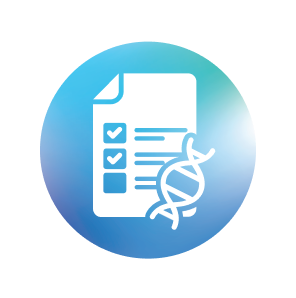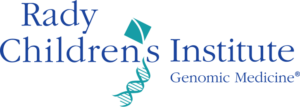For Providers: What you need to know
The BeginNGS pilot is currently only available through participation in the research study. This page provides ordering information for clinicians from participating BeginNGS research partners.
The BeginNGS pilot is not about replacing the current biochemical newborn screening approach (for at least 35 known conditions) – rather, it is a complement to the newborn screening processes and infrastructure that are already in place.
Research Partner Hospital Ordering Overview
1. Enroll Research Subject in Ordering Portal
2. Print Requisition Form from Portal
3. Ship Samples + Requisition Form to RCIGM
Partner account required.
Need help? (858) 966-8127

Gene List
The BeginNGS newborn sequencing test only screens for pediatric onset genetic diseases which currently have documented medical interventions.
You can download a list of genes and the conditions included in BeginNGS, including the current and previous versions here.
Detailed Ordering Instructions
General Instructions
Consent & Sample Collection
- Follow the research study protocol to obtain consent for the research subject for testing. If you have questions about informed consent, genetic counselors at RCIGM are available to speak with providers.
- Request a sample testing kit if this is the first time ordering or you do not have RCIGM sample testing kits on hand. Please allow at least 24 hours for receipt of the sample testing kit.
- Collect sample(s) following the sample specimen requirements:
Label all samples with two research subject identifiers (Name/DOB/MRN).
See requisition form for sample and labeling requirements.
Package each person’s specimen(s) in a separate biohazard bag.
Requisition / Portal
- Complete the Requisition Form. Existing partners use the online portalYou will need to authenticate via RCHSD's Microsoft 365 authentication system.
Partner account required. to complete the requisition form.
Package & Ship Samples
- Package the sample(s) according to the shipping instructions and include a copy of the requisition form.
- Send sample via First Overnight delivery and follow the shipping instructions. NOTE: the RCIGM laboratory accepts samples Monday through Saturday until 3pm PST. View holiday schedule
- After shipping, send tracking number to RCIGM_rWGS@rchsd.org and RCIGM_ClinicalLab@rchsd.org.
If you have questions about the BeginNGS ordering instructions, you can contact us at RCIGM_rWGS@rchsd.org.
Specimen Requirements
*Only licensed clinicians associated with the BeginNGS research study can order the BeginNGS test. We are unable to provide services directly to patient families.
Dried Blood Spots (DBS)
- Please make every effort to provide all available circles on a Whatman 903 protein saver card. Minimum requirement is one Whatman 903 protein saver card with three, 10 mm diameter spots filled with peripheral blood. Specimen card should be dried for at least 3 hours before shipment. When collecting, do not squeeze or milk the puncture site to fill the card spot.
Labeling Requirements
- Label dried blood spot sample with at least two identifiers.
- Preferred: research subject's full name and date of birth.
- We strongly recommend including the medical record number and/or specimen ID number also.
Note: In the event that the Clinical Genome Center does not receive sufficient sample material to complete the testing, test will be cancelled, and the ordering provider will be notified. The laboratory will not request new samples, nor perform another BeginNGS test for samples that do not meet quality metrics.
Shipping Instructions
Shipping Conditions
- Do not freeze or refrigerate.
- Specimen cards should be stored at room temperature in an arid location, preferably less than 30% humidity. Specimen cards, once dried, should be shipped to RCIGM.
- To aid in preventing moisture accumulation during shipment, we recommend including a desiccant or absorbent pack and humidity indicator card in the package when available.
Shipping Address
Rady Children’s Institute for Genomic Medicine
Attn: Clinical Genome Center
7910 Frost St, Suite 240
San Diego, CA 92123
Results Delivery
- Results are typically delivered within 14 days for BeginNGS.
- Positive results will be communicated directly to the ordering provider, followed by electronic notification.
- Negative and inconclusive results will be communicated by electronic notification.
Hours of Operation
The RCIGM lab accepts samples for accessioning on Mondays through Saturdays from 8am until 6:30pm PST. Earliest delivery is preferred.
NOTE: The Clinical Genome Center is closed on Sundays.
Holidays: Samples are not accepted nor accessioned on major national holidays: New Year’s Day, Memorial Day, 4th of July, Thanksgiving and Christmas.
Ready to Order?
Partner account required.
Need help? (858) 966-8127
Frequently Asked Questions
Genomic analysis and interpretation will be performed for more than 400 early onset actionable genetic conditions. See gene list here.
- A negative screen result indicates that no reportable pathogenic or likely pathogenic variants in any of the screened genes were identified for the current version of BeginNGS.
- A positive screen result indicates that there was a reportable pathogenic or likely pathogenic variants in any of the screened genes for the current version of BeginNGS.
- An inconclusive result indicates that the screening test could not be performed either due to insufficient sample or low data quality.
Results are typically delivered within 14 days for BeginNGS. Positive results will be communicated directly to the ordering provider, followed by electronic notification. Negative and inconclusive results will be communicated by electronic notification via email and/or portal.
Two reports will be provided for positive BeginNGS research study results.
- A lab-issued report with the gene, variant, and associated condition(s) result information.
- A research team-issued medical follow-up guidance report with a plain language summary of the results and the confirmatory testing, treatment, management and intervention recommendations.
The BeginNGS research study is a screening test. Confirmatory testing is needed, specific details will be available in the research team-issued medical follow-up guidance report.
Results of the BeginNGS test will be provided by a study clinician.
Analysis is restricted to
- single nucleotide variants (SNVs) in BeginNGS genes that have at least one Likely Pathogenic or Pathogenic variant classification in the Clinvar database version at the time of testing,
- expected loss of function variants,
- and monogenic deletion or duplication copy number variants (CNVs).
Variants are reported if they meet RCIGM classification criteria as Likely Pathogenic or Pathogenic and are consistent with the pattern of inheritance for the gene-condition pair. Carrier status for conditions associated with autosomal recessive inheritance only are not reported.
Dried blood spots are used for BeginNGS. Please make every effort to provide all available circles on a Whatman 903 protein saver card. The minimum requirement is one Whatman 903 protein saver card with three (3), 10 mm diameter spots filled with peripheral blood. Specimen card should be dried for at least 3 hours before shipment. When collecting, do not squeeze or milk the puncture site to fill the card spot.
Genome to Treatment (GTRx) is a virtual, automated system for acute management guidance for seriously ill newborns, infants and children with newly diagnosed genetic diseases. GTRx provides an urgency category for each disorder included in the BeginNGS research study.
Conditions will be categorized as non-urgent, semi-urgent, and urgent.
- A non-urgent positive screen result indicated that the individual may be at risk of developing a disease that does not require urgent treatment.
- A semi-urgent positive screen result indicates that the individual may be at risk of developing a disease that may require treatment within a few weeks.
- An urgent positive screen result indicates that the individual may be at risk of developing a disease that is life-threatening and may require urgent treatment.
Please visit gtrx.radygenomiclab.com to see the urgency designation for each condition.
Every baby in United States receives a standard biochemical Newborn Screening test that can identify at least 35 different childhood diseases that have effective treatments. The BeginNGS study will test for over 400 childhood genetic diseases.
Data and samples are collected from the research subjects. We will not share data or samples with other researchers in a way that could identify the research subject. Information obtained on research subjects during this study will be recorded in a research record and stored in a password-protected secure database with limited access to study personnel. Samples will be stored without identifying information in the Rady Children’s Institute for Genomic Medicine’s laboratory and in other laboratories that analyze the chemical patterns in your child’s blood.
The BeginNGS research study takes privacy very seriously. Results of studies may be published, but the name, date of birth, or other personal information of research subjects will not appear in any such publication. However, it is possible that unique physical features or genetic changes may allow for indirect identification of a research subject.
We retain the identity of research subjects in the Rady Children’s Institute for Genomic Medicine’s database linked to the sample that was obtained. We take many steps to make sure that the information and test results we collect are kept private and confidential.
Loss of confidentiality regarding genetic diagnosis provides a small risk for discrimination. A Federal law called the provides many protections against genetic discrimination. For more information on GINA, please see this handout:
- GINA & You (English)
- GINA y Tú (Spanish)
For general information about the risks of WGS, please see this handout:
- About WGS (English)
- Sobre la Secuenciación Rápida del Genoma Completo (Spanish)

